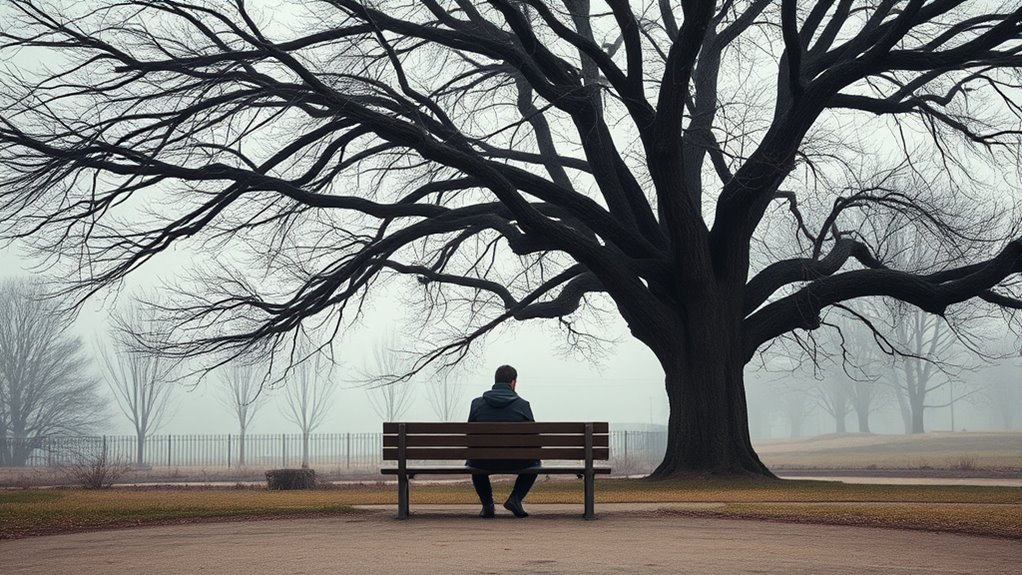Loneliness impacts your health just as seriously as smoking or obesity by triggering stress responses that harm your body. It reduces activity in your brain’s reward system, lowers happiness, and boosts stress hormones like cortisol, leading to inflammation and increased disease risk. Chronic loneliness weakens your immune system and raises blood pressure, making you more vulnerable. Recognizing these effects highlights how crucial social bonds are for your mental and physical resilience—if you’re curious, there’s more to uncover.
Key Takeaways
- Loneliness triggers stress hormones like cortisol, damaging organs and weakening immune function similar to smoking’s effects.
- Chronic loneliness increases inflammation and blood pressure, elevating cardiovascular risks comparable to smoking.
- Reduced brain activity related to reward and emotional regulation from loneliness impacts mental health akin to smoking.
- Lack of social bonds diminishes resilience and emotional stability, heightening health vulnerabilities like smoking does.
- Recognizing loneliness as a serious health risk encourages social engagement to prevent comparable health consequences.

Have you ever wondered why loneliness can feel so overwhelming? It’s because, at its core, loneliness strips away something essential to your emotional well-being—your sense of social connection. When you’re isolated, your mind perceives a threat to your safety and survival, triggering stress responses that can have far-reaching effects on your health. Social connection isn’t just about having people around; it’s a fundamental human need that supports your mental and physical resilience. Without meaningful interactions, you may notice your mood plummeting, your confidence waning, and your overall emotional health deteriorating. This isn’t just about feeling lonely; it’s about how loneliness actively influences your brain and body, increasing risks for serious health issues.
Research shows that loneliness affects your brain in ways similar to other major health risks, like smoking or obesity. When you’re socially disconnected, your brain releases stress hormones such as cortisol, which, over time, can damage crucial organs and weaken your immune system. This chronic stress response doesn’t just make you feel bad emotionally; it makes you physically vulnerable. It increases inflammation, raises blood pressure, and even impacts your cardiovascular health. The emotional toll is undeniable, but the physical consequences are equally alarming. The lack of social connection can diminish your capacity to regulate emotions, making you more prone to anxiety and depression. When you’re lonely, your brain’s reward system is less active, which reduces feelings of happiness and satisfaction, creating a vicious cycle that’s tough to break. Additionally, research highlights that high-quality social bonds can significantly mitigate these adverse effects, emphasizing the importance of nurturing meaningful relationships.
Loneliness triggers stress hormones that harm your brain, immune system, and overall physical health.
Your emotional well-being depends heavily on your social bonds. Having people you trust and feel close to can buffer the negative effects of stress, helping you recover more quickly from setbacks. When your social connection is strong, it boosts your resilience, making you better equipped to handle life’s challenges. Conversely, prolonged loneliness can lead to a decline in emotional health, reinforcing feelings of worthlessness or despair. It’s not just about being alone; it’s about feeling disconnected from others in a meaningful way. That sense of belonging fuels your emotional stability and helps maintain your overall health. Without it, you’re more vulnerable to mental health struggles and physical illnesses.
Understanding this connection makes it clear why loneliness isn’t just an emotional state but a serious health risk. Prioritizing social connection and nurturing relationships are essential steps toward safeguarding your emotional well-being and reducing the health risks associated with loneliness. Recognizing how deeply they’re intertwined can motivate you to reach out, build community, and foster the social bonds that are vital for your survival.
Frequently Asked Questions
Can Loneliness Be Completely Cured?
You wonder if loneliness can be completely cured. While it’s challenging, building emotional resilience and engaging in social interventions can markedly reduce feelings of loneliness. You can improve your social connections by fostering meaningful relationships and seeking support when needed. Although loneliness may not be entirely eradicated, adopting these strategies helps you manage it better, leading to a more connected and fulfilling life.
How Does Loneliness Affect Children Differently Than Adults?
Imagine loneliness as a storm cloud hanging over both children and adults, but its impact on children is like lightning striking their delicate minds. It disrupts child development and hampers emotional resilience, making them more vulnerable to anxiety and depression. Unlike adults, children haven’t built strong emotional defenses yet, so loneliness can shape their future mental health, emphasizing the need for early connection and support to weather the storm.
Are There Specific Groups More Vulnerable to Loneliness?
You might be more vulnerable to loneliness if you’re part of certain groups facing social isolation or demographic disparities. Older adults, minorities, and those with limited social networks often experience higher loneliness levels. Factors like language barriers, health issues, or economic challenges can increase your risk. Recognizing these vulnerable groups helps you understand how social isolation impacts different populations and underscores the importance of targeted support and community connection.
What Role Does Technology Play in Loneliness?
Imagine a web of digital isolation that traps you in a glow, where social media impacts feel like echoes in an empty hall. You scroll endlessly, craving connection but often feeling more alone. Technology promises closeness but sometimes acts as a barrier, replacing face-to-face interactions. It’s easy to forget that behind screens, genuine bonds fade, leaving you with a digital mirage that deepens loneliness instead of dissolving it.
Can Loneliness Be Contagious Within Social Networks?
You might wonder if loneliness spreads through social networks. It’s true—social contagion and emotional transmission can make loneliness contagious. When someone in your circle feels isolated, it can influence your own feelings, creating a ripple effect. This emotional transmission means loneliness isn’t just an individual issue; it can spread among friends, family, or colleagues, highlighting the importance of supportive connections to break the cycle.
Conclusion
As you reflect on the science behind loneliness, it’s almost ironic how a simple feeling can impact your health as much as smoking. You might find it surprising that, just when you’re thinking about reconnecting, a chance encounter or shared moment could be the very thing you need to break free. Sometimes, life’s coincidences remind us that a little human connection isn’t just comforting—it’s essential. Don’t wait; reach out before loneliness becomes a silent, deadly habit.










